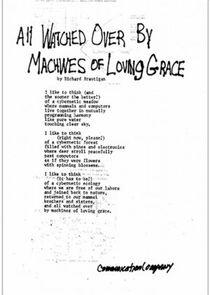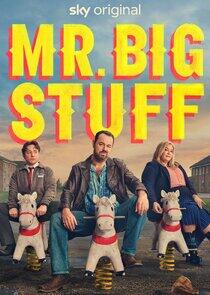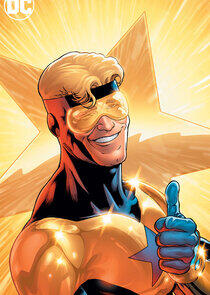All Watched Over by Machines of Loving Grace - Season 1

Season 1

Episodes

Love and Power
The film tells the story of two perfect worlds. One is the small group of disciples around the novelist Ayn Rand in the 1950s. They saw themselves as a prototype for a future society where everyone could follow their own selfish desires. The other is the global utopia that digital entrepreneurs in Silicon Valley set out to create in the 1990s. Many of them were also disciples of Ayn Rand. They believed that the new computer networks would allow the creation of a society where everyone could follow their own desires, yet there would not be anarchy. They were joined by Alan Greenspan who had also been a disciple of Ayn Rand. He became convinced that the computers were creating a new kind of stable capitalism - "Like a New Planet", he said.
But the dream of stability in both worlds would be torn apart by the two dynamic human forces - love and power.

The Use and Abuse of Vegetational Concepts
This is the story of how our modern scientific idea of nature, the self-regulating ecosystem, is actually a machine fantasy. It has little to do with the real complexity of nature. It is based on cybernetic ideas that were projected on to nature in the 1950s by ambitious scientists. A static machine theory of order that sees humans, and everything else on the planet, as components - cogs - in a system.
But in an age disillusioned with politics, the self-regulating ecosystem has become the model for utopian ideas of human 'self-organizing networks' - dreams of new ways of organising societies without leaders, as in the Facebook and Twitter revolutions, and in global visions of connectivity like the Gaia theory.
This powerful idea emerged out of the hippie communes in America in the 1960s, and from counterculture computer scientists who believed that global webs of computers could liberate the world.
But, at the very moment this was happening, the science of ecology discovered that the theory of the self-regulating ecosystem wasn't true. Instead they found that nature was really dynamic and constantly changing in unpredictable ways. But the dream of the self-organizing network had by now captured our imaginations - because it offered an alternative to the dangerous and discredited ideas of politics.

The Monkey in the Machine and the Machine in the Monkey
This episode looks at why we humans find this machine vision so beguiling. The film argues it is because all political dreams of changing the world for the better seem to have failed - so we have retreated into machine-fantasies that say we have no control over our actions because they excuse our failure.
At the heart of the film is one of the most famous scientists in the world - Bill Hamilton. He argued that human behaviour is really guided by codes buried deep within us. It was later popularised by Richard Dawkins as 'the selfish gene'. It said that individual human beings are really just machines whose only job is to make sure the codes are passed on for eternity.
The film begins in 2000 in the jungles of the Congo and Rwanda. Hamilton is there to help prove his dark theories. But all around him the Congo is being torn apart by 'Africa's First World War'. The film then interweaves the two stories - the strange roots of Hamilton's theories, and the history of the West's tortured relationship with the Congo over the past 100 years.
Recently Updated Shows

Mr Bigstuff
In Mr Bigstuff, Glen and his fiancée Kirsty share a perfect, perfectly mundane life together. Sure, Glen's got crippling erectile dysfunction and Kirsty has a secret shoplifting habit, but they're happy. That is until Lee comes crashing into their lives, whilst on the run from a past that's quickly catching up with him. The trio are forced together: a perfectionist, a fantasist and an anarchist all living under the same roof in an Essex cul-de-sac. It's not long before their ‘perfect' lives start to unravel faster than the weave of a cheap carpet.

The Daily Show
Hosted by a rotating cast of comedy greats, The Daily Show remains the go-to source for provocative satire, insightful interviews and an award-winning team of correspondents and contributors.

Booster Gold
A loser from the future who uses his basic future technology to come back to today to pretend to be a superhero.

60 Minutes
60 Minutes has been on the air since 1968, beginning on a Tuesday, but spending most of its time on Sundays, where it remains today. This popular news magazine provides both hard hitting investigations, interviews and features, along with people in the news and current events. 60 Minutes has set unprecedented records in the Nielsen's ratings with a number 1 rating, five times, making it among the most successful TV programs in all of television history. This series has won more Emmy awards than any other news program and in 2003, Don Hewitt, the creator (back in 1968), was awarded the Lifetime Achievement Emmy, along with the 60 Minute correspondents. Added to the 11 Peabody awards, this phenomenally long-lived series has collected 78 awards up to the 2005 season and remains among the viewers top choice for news magazine features.

All Her Fault
Set in Chicago, Marissa Irvine arrives at 14 Arthur Avenue, expecting to pick up her young son Milo from his first playdate with a boy at his new school. But the woman who answers the door isn't a mother she recognizes. She isn't the nanny. She doesn't have Milo. And so begins every parent's worst nightmare.